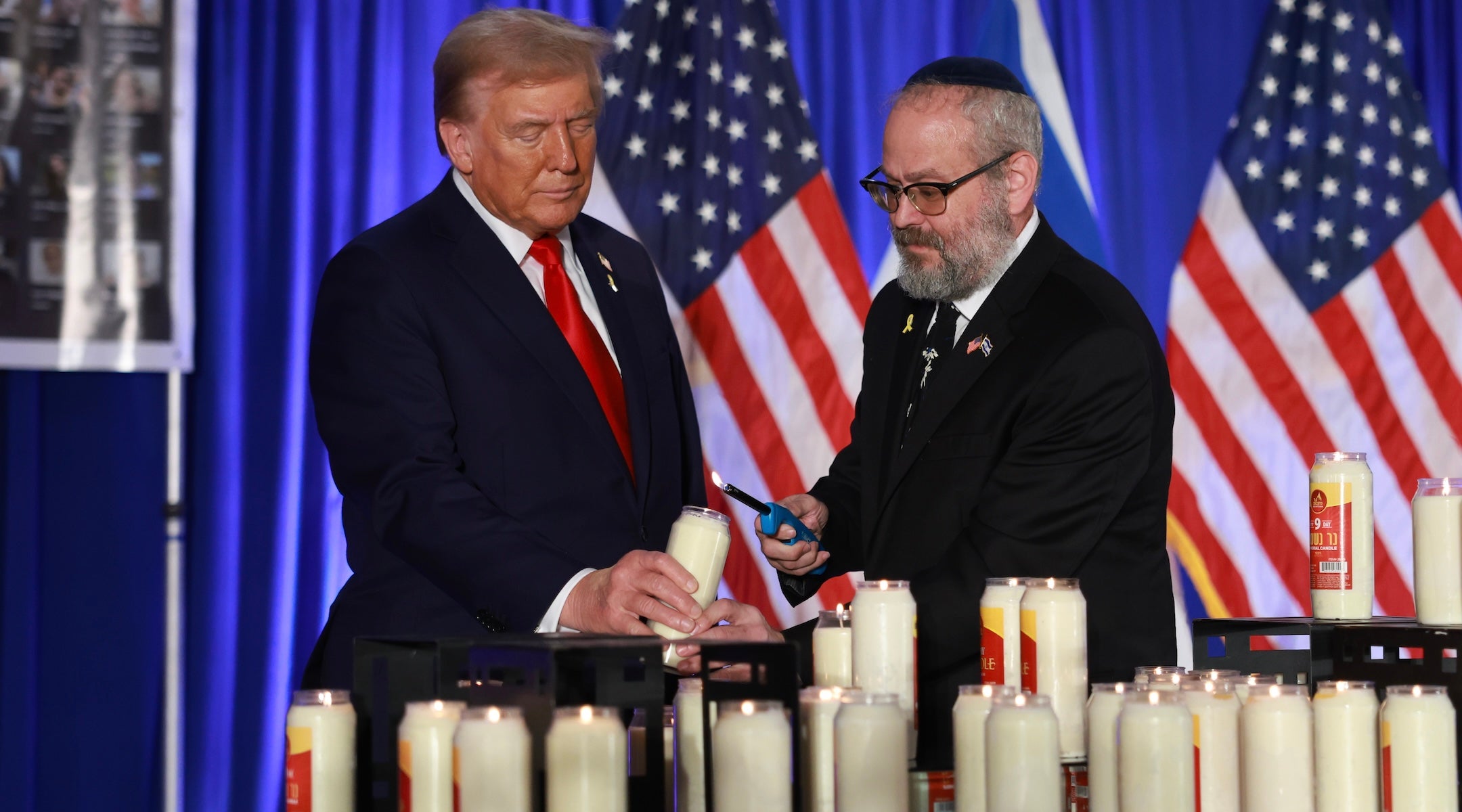Kaploun leans on personal story and Holocaust education in bid to become Trump’s antisemitism envoy
Democrats pressed him on Trump’s response to right-wing antisemitism as he vowed bipartisan outreach

Donald Trump and Yehuda Kaploun light a candle during an Oct. 7 remembrance event at the Trump National Doral Golf Club in Doral, Florida on Oct. 07, 2024. Photo by Joe Raedle/Getty Images
(JTA) — Rabbi Yehuda Kaploun, President Donald Trump’s nominee to serve as U.S. antisemitism envoy, pledged to elevate Holocaust education and combat what he called a “global problem” of ignorance-driven antisemitism during a Senate confirmation hearing on Wednesday, while sidestepping the more partisan controversies that prompted a rebuke from a group of House Democrats ahead of the session.
“Together with bipartisan support, we must educate the world to respect one another,” Kaploun told the Senate Foreign Relations Committee in an opening statement that drew heavily on his personal encounters with antisemitism — from childhood taunts in Brooklyn to the Crown Heights riots and the deaths of family members on 9/11 and Oct. 7.
“I pledge to all of you here, I will not waver and I will not rest … to fight antisemitism everywhere and to make this world a better arena for God to dwell,” he said.
Kaploun, a Hasidic rabbi, Miami-based businessman and Trump ally, cast antisemitism as “a symbol of a larger hatred” and warned that societies that tolerate it invite broader violence.
He emphasized repeatedly that the core of the job must be education — of Holocaust history, of Jewish life in America and of the “Judeo-Christian values our country was founded on.”
But committee Democrats pressed him on political issues, including the administration’s muted response to a friendly interview that right-wing commentator Tucker Carlson recently conducted with Nick Fuentes, a antisemitic influencer. Asked whether Trump’s comments about Carlson — praising him while declining to denounce Fuentes — were appropriate, Kaploun responded by stressing freedom of speech while asserting that the administration is clear in condemning antisemitism.
“You have a right to hate, but we have a right to explain and stand up and abhor everything that you say,” he said, adding that he believes in condemning antisemitic remarks “whenever they need to be condemned” while maintaining free expression rights.
The exchange came a day after 18 House Democrats urged the Senate to reject Kaploun’s nomination, citing his past comments about Democrats and his failure to publicly challenge Trump’s use of antisemitic tropes during the 2024 campaign. The letter also highlighted past litigation involving Kaploun in Miami, previously reported by the Jewish Telegraphic Agency.
Kaploun pointed to the International Holocaust Remembrance Alliance’s working definition of antisemitism when asked about distinguishing antisemitism from criticism of Israel. “Anyone has a right to criticize Israel,” but singling out the country while ignoring other global issues can cross the line, he said.
Outside groups were divided on Kaploun. In a letter to the committee, Orthodox Union Advocacy Center leaders Nathan Diament and Isaac Pretter did not explicitly endorse Kaploun but said he is “familiar with the issues facing Jews around the world” and has shown a willingness to work across the aisle, including by co-authoring a JTA op-ed earlier this year with the two previous antisemitism envoys. But another national Jewish group, the liberal Zionist New Jewish Network, came out in direct opposition and called on senators to reject the nomination. “The administration’s weaponization of antisemitism has been appalling. Confirmation of Rabbi Kaploun adds insult to injury,” wrote the group’s CEO, Hadar Susskind.
The committee has not yet scheduled a vote on the nomination.














